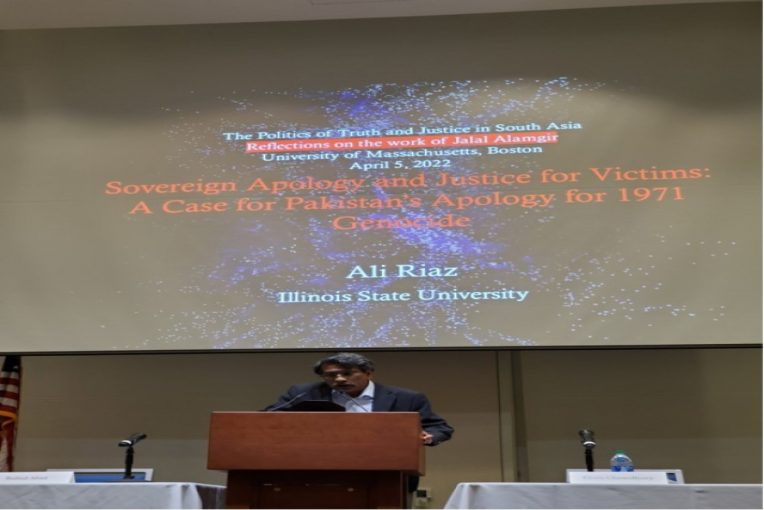Distinguished Professor Ali Riaz delivered the keynote lecture at the symposium on ‘the Politics of Truth and Justice in South’ held at the University of Massachusetts, Boston. The title of his lecture was, “Sovereign Apology and Justice for Victims: A Case for Pakistan’s Apology for 1971 Genocide.” Riaz examined the causes of and conditions for apologies by nations to other nations for its past misdeeds and highlighted what it means to apologize, why nations need to apologize, and why Pakistan must apologize to Bangladesh for the 1971 genocide.
Drawing on the existing literature, he argued that a complete apology means acknowledgment of a wrong committed, an acceptance of responsibility for having committed the wrong, an expression of regret or remorse for both the harm and for having committed the wrong, and a commitment to reparation or non-repetition of the wrong.
He said although it is commonly argued that the issue of apology has not been widely incorporated in international law, the International Law Commission’s draft articles on the Responsibility of States for Internationally Wrongful Acts, particularly Article 37, have addressed it. It says that a formal apology may be appropriate as satisfaction for injury caused by an internationally wrongful act(s) when a full reparation is not possible by restitution or compensation.
Highlighting the genocide perpetrated by the Pakistani Army during the 1971 war of independence of Bangladesh, Riaz insisted that Pakistan should apologize without further delay. Riaz said that Pakistan should apologize for at least four reasons; they are moral, for reconciliation among South Asian countries, to avoid lingering embarrassment, and to avoid its past mistakes. It is in this context Riaz further said that a sovereign apology is not a single act and must be sustained through various efforts.
The symposium was organized in memory of Dr. Jalal Alamgir, a political science professor at UMass Boston who passed away in 2011 in an accident in Thailand. Dr. Alamgir was an expert on South Asian politics. The symposium was held on April 5, 2022.

